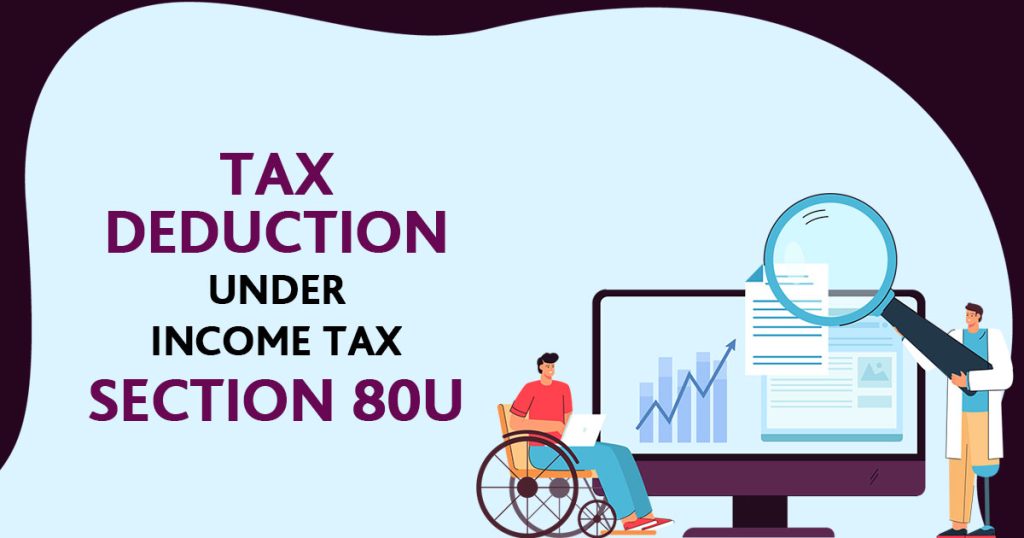The 80U Deduction is a valuable provision in the Indian Income Tax Act that offers tax relief to individuals with disabilities. If you or a family member have a disability, understanding this deduction can lead to significant tax savings and financial benefits.
What is the 80U Deduction?
The 80U Deduction, as per Section 80U of the Income Tax Act, provides tax benefits to individuals who have a disability. This deduction is designed to ease the financial burden on those living with disabilities and their families by reducing their taxable income.
Eligibility Criteria for 80U Deduction
To claim the 80U Deduction, it’s crucial to meet specific eligibility criteria. These criteria are defined by the Income Tax Act and play a significant role in determining whether an individual qualifies for this deduction.

Benefits of the 80U Deduction
Understanding the benefits of the 80U Deduction is essential to grasp how it can positively impact your financial situation. Here are some key advantages:
1. Reduced Taxable Income
The primary benefit of the 80U Deduction is a reduction in your taxable income. The amount you can claim as a deduction depends on the severity of the disability, as certified by a medical authority. This reduction directly lowers your tax liability.
2. Improved Financial Stability
Living with a disability often entails higher medical and caregiving expenses. By lowering your taxable income, the 80U Deduction helps alleviate some of the financial burdens associated with disability, providing greater financial stability.
3. Enhanced Quality of Life
The financial relief offered by the 80U Deduction can contribute to an improved quality of life for individuals with disabilities. It can be used to cover medical costs, assistive devices, therapies, and other essential needs.
4. Support for Caregivers
Family members or legal guardians caring for individuals with disabilities can also benefit from the 80U Deduction. It recognizes the additional financial responsibilities that caregivers often shoulder.
Documentation Requirements for Claiming the 80U Deduction
To successfully claim the 80U Deduction, you must provide the following documentation:
1. Medical Certificate
A crucial document is a medical certificate issued by a certified medical authority. This certificate should specify the nature and extent of the disability. It plays a fundamental role in determining eligibility.
2. Form 10-IA
When filing your income tax return, you’ll need to attach Form 10-IA along with the medical certificate. This form is essential for claiming the 80U Deduction, and it should include details about the disability and the certifying authority.
3. Self-Declaration
You may also be required to provide a self-declaration stating that the disability is as per the criteria defined under Section 80U of the Income Tax Act.
4. Other Supporting Documents
Keep records of all medical bills, expenses related to the disability, and any other relevant documents. These can be useful if your claim is ever subject to scrutiny.
It’s vital to maintain accurate and up-to-date documentation to ensure a smooth and successful claim of the 80U Deduction.
How to Claim the 80U Deduction
Claiming the 80U Deduction requires following specific steps during the income tax filing process. Here’s a step-by-step guide:
1. Gather Required Documentation
Before you start filing your taxes, ensure you have all the necessary documents in hand:
- Medical certificate issued by a recognized medical authority.
- Form 10-IA, properly filled out with details of the disability.
- Self-declaration as per the prescribed format.
- Supporting documents, including medical bills and receipts.
2. Calculate the Deduction Amount
The deduction amount under Section 80U varies depending on the severity of the disability:
- For a disability degree of 40% or more but less than 80%, you can claim a deduction of Rs. 75,000.
- For a disability degree of 80% or more, the deduction amount increases to Rs. 1,25,000.
3. Fill Out Your Tax Return
When filling out your income tax return, make sure to include the 80U Deduction under the relevant section (usually ‘Deductions’ or ‘Exemptions’).
4. Attach Documents
Attach the following documents along with your tax return:
- Medical certificate.
- Form 10-IA.
- Self-declaration.
- Supporting documents.
5. Review and File
Carefully review your tax return to ensure all information is accurate and the deductions are correctly applied. Once reviewed, you can file your tax return either online or through a physical filing process.
6. Retain Copies
It’s crucial to keep copies of all submitted documents and your filed tax return for future reference.
Common Mistakes to Avoid
While claiming the 80U Deduction, individuals often make common errors that can lead to complications or claim rejection. Here are some pitfalls to avoid:
1. Incorrect Documentation
Submitting inaccurate or incomplete documentation is a frequent mistake. Ensure all forms are filled out correctly, and the medical certificate is issued by a recognized medical authority.
2. Wrong Calculation
Calculating the deduction amount incorrectly can lead to issues. Double-check the disability degree and use the correct deduction limit.
3. Missing the Deadline
Failing to file your taxes within the specified deadline can result in penalties and the loss of tax benefits. Be aware of the tax filing due dates.
4. Not Seeking Professional Advice
If you’re unsure about the eligibility criteria or how to claim the deduction, it’s wise to consult with a tax professional or accountant who specializes in income tax matters.
By following these steps and avoiding common mistakes, you can successfully claim the 80U Deduction and benefit from the tax relief it provides.
Recent Changes and Updates in the 80U Deduction
Tax laws are subject to change, and it’s essential to stay informed about any recent updates that may affect your eligibility or benefits related to the 80U Deduction. Here are some noteworthy changes and updates you should be aware of:
1. Increase in Deduction Limit
In recent years, there has been an increase in the maximum deduction limit available under Section 80U. Be sure to check the current limit for the assessment year you’re filing for, as it can significantly impact your potential tax savings.
2. Changes in Eligibility Criteria
The eligibility criteria for claiming the 80U Deduction may change from one assessment year to another. Be aware of these changes, as they directly impact your eligibility. What was applicable in the previous year may not be the same in the current year.
3. Online Filing Requirements
Tax authorities are increasingly moving toward online filing systems. Ensure you understand the online filing requirements and procedures for claiming the 80U Deduction. Staying compliant with these processes is crucial.
4. Documentation Standards
Tax authorities may set specific documentation standards for claiming the 80U Deduction. Make sure your medical certificate and other supporting documents meet these standards to avoid complications during the tax assessment.
5. Legal Interpretations
Tax laws are subject to legal interpretations, which can impact how deductions like 80U are applied. Staying informed about any legal interpretations or court rulings related to this deduction is essential.
6. Impact of Economic Changes
Economic changes, such as inflation rates and economic policies, can indirectly affect the 80U Deduction. Understanding how these factors influence your overall financial situation is crucial when optimizing your tax strategy.
Keeping yourself updated about these recent changes and updates related to the 80U Deduction will enable you to make informed decisions and maximize your tax savings effectively.
Real-Life Success Stories with the 80U Deduction
To illustrate the real-world impact of the 80U Deduction, let’s explore a few success stories of individuals who have benefited from this tax provision:
1. Riya’s Educational Journey
Riya, a young student with a severe disability, availed of the 80U Deduction to cover her education-related expenses. The tax savings allowed her to pursue higher education without imposing a financial burden on her family.
2. Vikram’s Journey to Independence
Vikram, who lives with a disability, used the 80U Deduction to purchase assistive devices and make modifications to his home to enhance accessibility. This not only improved his quality of life but also supported his journey toward greater independence.
3. Support for Caregivers
The 80U Deduction not only benefits individuals with disabilities but also their caregivers. Families like the Singhs have used this deduction to ease the financial responsibilities associated with caregiving, ensuring their loved ones receive the best possible care.
These real-life success stories demonstrate the positive impact of the 80U Deduction on individuals and families, highlighting its role in improving the lives of those with disabilities.
FAQs about the 80U Deduction
As individuals explore the 80U Deduction and its benefits, they often have questions and concerns. Here are some frequently asked questions and their answers to provide clarity:
1. Who is eligible for the 80U Deduction?
- Individuals who have a disability as defined under Section 80U of the Income Tax Act.
- The disability must be certified by a medical authority.
- The severity of the disability determines the deduction amount.
2. What types of disabilities are covered under Section 80U?
- Section 80U covers a wide range of disabilities, including blindness, low vision, hearing impairment, locomotor disability, mental illness, and more.
- The disability must be certified as per the guidelines outlined in the Act.
3. How is the severity of the disability determined?
- The severity is determined by a medical authority based on specific criteria outlined in the Income Tax Act.
- The disability may be categorized as “40% or more but less than 80%” or “80% or more.”
4. Can I claim the 80U Deduction for my dependent family members with disabilities?
- Yes, if you are responsible for the maintenance of a dependent with a disability, you can claim the deduction on their behalf.
5. Is there an age limit for claiming the 80U Deduction?
- There is no age limit for claiming this deduction. It applies to individuals of all ages who meet the eligibility criteria.
6. Do I need to provide medical proof when claiming the deduction?
- Yes, a medical certificate issued by a recognized medical authority is a mandatory requirement when claiming the 80U Deduction.
7. How is the deduction amount calculated?
- The deduction amount depends on the severity of the disability:
8. Can I claim other deductions along with the 80U Deduction?
- Yes, you can claim other deductions and exemptions as applicable, provided you meet the eligibility criteria for each deduction.
9. Where can I find the latest information and forms related to the 80U Deduction?
- The official website of the Income Tax Department of India provides up-to-date information, forms, and guidelines related to the 80U Deduction.




